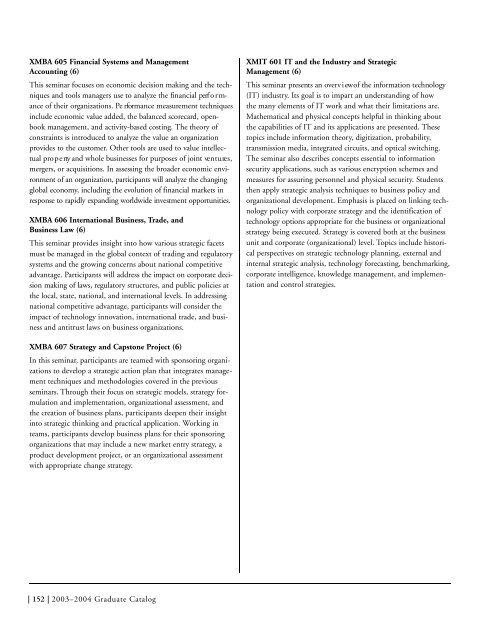A+B. Intro_SJ.1 - University of Maryland University College
A+B. Intro_SJ.1 - University of Maryland University College
A+B. Intro_SJ.1 - University of Maryland University College
You also want an ePaper? Increase the reach of your titles
YUMPU automatically turns print PDFs into web optimized ePapers that Google loves.
XMBA 605 Financial Systems and Management<br />
Accounting (6)<br />
This seminar focuses on economic decision making and the techniques<br />
and tools managers use to analyze the financial perf o r m-<br />
ance <strong>of</strong> their organizations. Pe rformance measurement techniques<br />
include economic value added, the balanced score c a rd, openbook<br />
management, and activity-based costing. The theory <strong>of</strong><br />
constraints is introduced to analyze the value an organization<br />
p rovides to the customer. Other tools are used to value intellectual<br />
p ro p e rty and whole businesses for purposes <strong>of</strong> joint ve n t u re s ,<br />
mergers, or acquisitions. In assessing the broader economic environment<br />
<strong>of</strong> an organization, participants will analyze the changing<br />
global economy, including the evolution <strong>of</strong> financial markets in<br />
response to rapidly expanding worldwide investment opport u n i t i e s .<br />
XMBA 606 International Business, Trade, and<br />
Business Law (6)<br />
This seminar provides insight into how various strategic facets<br />
must be managed in the global context <strong>of</strong> trading and regulatory<br />
systems and the growing concerns about national competitive<br />
advantage. Participants will address the impact on corporate decision<br />
making <strong>of</strong> laws, re g u l a t o ry structures, and public policies at<br />
the local, state, national, and international levels. In addressing<br />
national competitive advantage, participants will consider the<br />
impact <strong>of</strong> technology innovation, international trade, and business<br />
and antitrust laws on business organizations.<br />
XMIT 601 IT and the Industry and Strategic<br />
Management (6)<br />
This seminar presents an ove rv i ew <strong>of</strong> the information technology<br />
(IT) industry. Its goal is to impart an understanding <strong>of</strong> how<br />
the many elements <strong>of</strong> IT work and what their limitations are.<br />
Mathematical and physical concepts helpful in thinking about<br />
the capabilities <strong>of</strong> IT and its applications are presented. These<br />
topics include information theory, digitization, probability,<br />
transmission media, integrated circuits, and optical switching.<br />
The seminar also describes concepts essential to information<br />
security applications, such as various encryption schemes and<br />
measures for assuring personnel and physical security. Students<br />
then apply strategic analysis techniques to business policy and<br />
organizational development. Emphasis is placed on linking technology<br />
policy with corporate strategy and the identification <strong>of</strong><br />
technology options appropriate for the business or organizational<br />
strategy being executed. Strategy is covered both at the business<br />
unit and corporate (organizational) level. Topics include historical<br />
perspectives on strategic technology planning, external and<br />
internal strategic analysis, technology forecasting, benchmarking,<br />
corporate intelligence, knowledge management, and implementation<br />
and control strategies.<br />
XMBA 607 Strategy and Capstone Project (6)<br />
In this seminar, participants are teamed with sponsoring organizations<br />
to develop a strategic action plan that integrates management<br />
techniques and methodologies covered in the previous<br />
seminars. Through their focus on strategic models, strategy formulation<br />
and implementation, organizational assessment, and<br />
the creation <strong>of</strong> business plans, participants deepen their insight<br />
into strategic thinking and practical application. Working in<br />
teams, participants develop business plans for their sponsoring<br />
organizations that may include a new market entry strategy, a<br />
product development project, or an organizational assessment<br />
with appropriate change strategy.<br />
| 152 | 2003–2004 Graduate Catalog

















